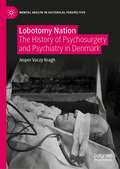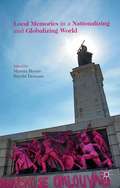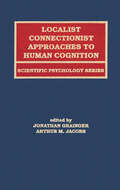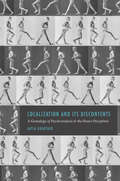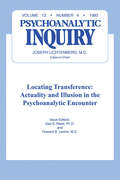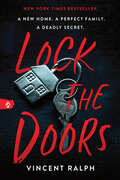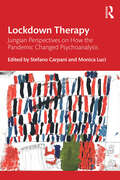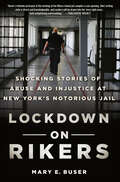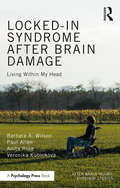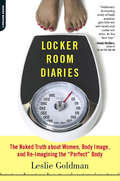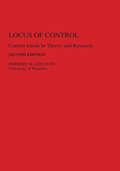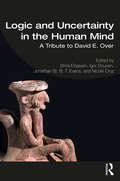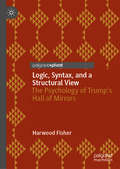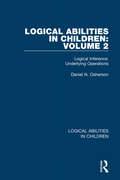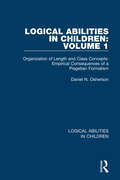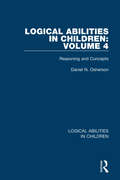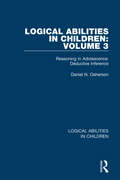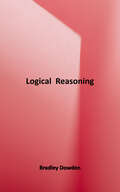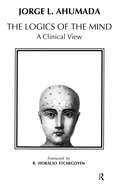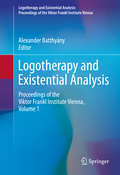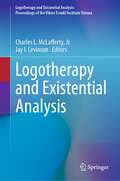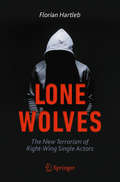- Table View
- List View
Loaded: Women and Addiction
by Jill TalbotHaving an addiction can follow the path of a great relationship that goes sour: there's the first blush of romance, the seduction ("you know you want to"), and the downward spiral into either obsession or breaking free.Jill Talbot is no stranger to addiction. Part autobiography, part exposé, Loaded: Women and Addiction weaves Talbot's own battles with addiction with various addiction stories of other women. The result is a captivating, honest look at the allure of addiction-be it to sex, drugs, alcohol, food, adventure, or infidelity-and ultimately its betrayal.Though addiction can be seductive, if you're waking up with guilt or making choices that harm others, it's probably a clue that things are out of control. Throughout Loaded, Talbot's razor-sharp honesty, heartbreaking self-awareness, and resolve to reveal the difficult truth of her relationship with past and present addictions is humbling and sometimes gut-wrenching. In sharing her struggles and her resolve to attain control over her addictions, Talbot speaks her truth while sending a message of hope to women everywhere.
Lobotomy Nation: The History of Psychosurgery and Psychiatry in Denmark (Mental Health in Historical Perspective)
by Jesper Vaczy KraghThis book tells the story of one of medicine’s most (in)famous treatments: the neurosurgical operation commonly known as lobotomy. Invented by Portuguese neurologist Egas Moniz in 1935, lobotomy or psychosurgery became widely used in a number of countries, including Denmark, where the treatment had a major breakthrough. In fact, evidence suggests that more lobotomies were performed in Denmark than any other country. However, the reason behind this unofficial world record has not yet been fully understood. Lobotomy Nation traces the history of psychosurgery and its ties to other psychiatric treatments such as malaria fever therapy, Cardiazol shock and insulin coma therapy, but it also situates lobotomy within a broader context. The book argues that the rise and fall of lobotomy is not just a story about psychiatry, it is also about society, culture and interventions towards vulnerable groups in the 20th century.
Local Agency and Peacebuilding
by Stefanie KapplerWhile agency has become the new buzzword for researchers in the area of peace and conflict studies, it remains a concept that is both under-theorised and contested in terms of how it transforms the disciplines of Politics, International Relations and Peace and Conflict. In this book, Kappler develops a relational and spatial concept of agency, enhancing our understanding of the complex and subtle processes through which peacebuilding actors engage and interact with each other. Using the EU's engagement in peacebuilding in Bosnia-Herzegovina as a primary case study, this book investigates outlines competing discourse clusters in the interplay between the EU and local actors engaged in creative cultural activities. An investigation of the contested nature of agency in its ability to give meaning to peacebuilding highlights the potential of local actors to impact upon and resist institutional discourses. Kappler also conveys the challenges of peacebuilding in Cyprus where there is a lack of connection between local and international discursive spaces, whilst the more limited depth of international intervention in South Africa in turn suggests a more flexible set of actors as well as more dynamic interaction in the emergence of peace-related discourses. This book provides an original discussion of agency in relation to EU peacebuilding, exploring the subtle forms of interaction between actors and framing the analysis in ways that allow for practical application.
Local Memories in a Nationalizing and Globalizing World
by Marnix Beyen Brecht DeseureIn historical studies, 'collective memory' is most often viewed as the product of nationalizing strategies carried out by political #65533;lites in the hope to create homogeneous nation-states. In contrast, this book asserts that collective memories develop out of a never-ending, triangular negotiation between local, national and transnational actors.
Local Negotiations of English Nationhood, 1570–1680
by John M. AdrianLocal Negotiations explores the vitality of early modern local consciousness. Even in an age of emerging nationhood, English men and women were still profoundly influenced by and even drew their primary identity from the parish, the town, and the county. This book examines how early modern writers invoke local places, traditions, and ways of thinking to respond to the larger political, religious, and cultural changes of the period. The opening chapter establishes the historical basis of local identity and describes the ways in which it was transformed in the second half of the sixteenth century. Each of the succeeding five chapters then focuses on a particular author and historical moment, and explores how local habits of thought are invoked to respond to a specific national initiative (political centralization, religious uniformity, court culture, civil war, and empire). Together, these chapters illustrate both the pervasiveness of local discourse and the range of possible responses to nationhood that it engendered. "
Localist Connectionist Approaches To Human Cognition (Scientific Psychology Series)
by Jonathan Grainger Arthur M. JacobsThis volume provides an overview of a relatively neglected branch of connectionism known as localist connectionism. The singling out of localist connectionism is motivated by the fact that some critical modeling strategies have been more readily applied in the development and testing of localist as opposed to distributed connectionist models (models using distributed hidden-unit representations and trained with a particular learning algorithm, typically back-propagation). One major theme emerging from this book is that localist connectionism currently provides an interesting means of evolving from verbal-boxological models of human cognition to computer-implemented algorithmic models. The other central messages conveyed are that the highly delicate issue of model testing, evaluation, and selection must be taken seriously, and that model-builders of the localist connectionist family have already shown exemplary steps in this direction.
Localization and Its Discontents: A Genealogy of Psychoanalysis & the Neuro Disciplines
by Katja GuentherPsychoanalysis and neurological medicine have promoted contrasting and seemingly irreconcilable notions of the modern self. Since Freud, psychoanalysts have relied on the spoken word in a therapeutic practice that has revolutionized our understanding of the mind. Neurologists and neurosurgeons, meanwhile, have used material apparatus—the scalpel, the electrode—to probe the workings of the nervous system, and in so doing have radically reshaped our understanding of the brain. Both operate in vastly different institutional and cultural contexts. Given these differences, it is remarkable that both fields found resources for their development in the same tradition of late nineteenth-century German medicine: neuropsychiatry. In Localization and Its Discontents, Katja Guenther investigates the significance of this common history, drawing on extensive archival research in seven countries, institutional analysis, and close examination of the practical conditions of scientific and clinical work. Her remarkable accomplishment not only reframes the history of psychoanalysis and the neuro disciplines, but also offers us new ways of thinking about their future.
Locating Transference: Psychoanalytic Inquiry, 13.4
by Gail S. Reed Howard B. LevineFirst published in 1993. Routledge is an imprint of Taylor & Francis, an informa company.
Lock the Doors
by Vincent RalphThe truth won't stay hidden behind locked doors.A brand new addictive, psychological thriller from the New York Times bestselling author of 14 WAYS TO DIE—for fans of Karen McManus, Holly Jackson, and Lisa Jewell.Tom's family have moved into their dream home. But pretty soon he starts to notice that something is very wrong—there are strange messages written on the wall and locks on the bedroom doors. On the OUTSIDE.The previous owners have moved just across the road and they seem like the perfect family. Their daughter Amy is beautiful and enigmatic but Tom is sure she's got something to hide. And he isn't going to stop until he finds the truth behind those locked doors. . .Will their dream home become a nightmare?
Lockdown Therapy: Jungian Perspectives on How the Pandemic Changed Psychoanalysis
by Monica Luci Stefano CarpaniThis fascinating volume explores — from the perspective both of analysts and their patients—how the COVID-19 pandemic quickly and unexpectedly created profound and lasting changes in the ways psychoanalysis is conducted, and what those changes mean for analysis moving forward. The first part of the book is made up of interviews conducted by Stefano Carpani with authoritative authors in analytical psychology during the earliest phase of lockdown, centered on themes of the pandemic, lockdown, and how each individual was coping with the challenges those circumstances brought on. The second part features personal essays that further details the subjective experiences of Jungian analysts and therapists worldwide, comprising a collection of reflections on how COVID-19 affected and changed the way analysts work with patients. These reflections focus on the theoretical, clinical, technical, and also practical points of view, including clinical materials on transference and counter-transference considerations. The third part of the book is specular to the second and offers reflections from patients’ perspective on how the pandemic changed their therapies and lockdown affected their experience of therapy. Patients have provided anonymous testimonies through their writing of how they experienced of the change of setting, mindset and related implications. A comprehensive overview of an important and ongoing conversation, Lockdown Therapy is crucial reading for Jungian analysts and scholars, as well as other clinicians training in analysis, psychotherapy and counselling.
Lockdown on Rikers: Shocking Stories of Abuse and Injustice at New York's Notorious Jail
by Mary E. BuserMary Buser began her career at Rikers Island as a social work intern, brimming with ideas and eager to help incarcerated women find a better path. Her reassignment to a men's jail coincided with the dawn of the city's "stop-and-frisk" policy, a flood of unprecedented arrests, and the biggest jailhouse build-up in New York City history.Committed to the possibility of growth for the scarred and tattooed masses who filed into her session booth, Buser was suddenly faced with black eyes, punched-out teeth, and frantic whispers of beatings by officers. Recognizing the greater danger of pointing a finger at one's captors, Buser attempted to help them, while also keeping them as well as herself, safe. Following her promotion to assistant chief, she was transferred to different jails, working in the Mental Health Center, and finally, at Rikers's notorious "jail within jail," the dreaded solitary confinement unit, where she saw horrors she'd never imagined. Finally, it became too much to bear, forcing Buser to flee Rikers and never look back - until now.Lockdown on Rikers shines a light into the deepest and most horrific recesses of the criminal justice system, and shows how far it has really drifted from the ideals we espouse.
Locked-in Syndrome after Brain Damage: Living within my head (After Brain Injury: Survivor Stories)
by Barbara Wilson Paul Allen Anita Rose Veronika KubickovaThe newest title in the series Survivor Stories, this book tells the story of Paul Allen, a photographer who likes opera and was a good baritone singer. At the age of 56 he sustained a stroke that left him paralysed and speechless. He has Locked-In Syndrome (LIS), a rare consequence of brain damage. Although Paul is fully conscious and his cognitive abilities are intact, he is unable to move or speak due to the paralysis of nearly all his voluntary muscles. However, Paul is keen to communicate and through his eye movements he tells his story, from his early life, career, singing and other interests, to the details of his stroke and the effects it has had on his life. The book also includes contributions from Paul’s wife Liz, who tells the story from her point of view, along with Paul’s physiotherapists, occupational therapists, speech therapists, psychologists and others from the Raphael Hospital who have assisted in Paul’s rehabilitation. In telling of his frustrations, his successes, his views on life and how he sees his future, Paul raises awareness of the quality of life possible for those with LIS. Combining scientific knowledge with personal narrative, this unique and optimistic book is of huge importance to any professional involved in the care of someone with a brain injury, and to the individuals and families touched by LIS.
Locker Room Diaries: The Naked Truth about Women, Body Image, and Re-imagining the "Perfect" Body
by Leslie GoldmanI wish my thighs were smaller. "If only I could lose ten pounds. " A wake-up call for any woman who has engaged in the "if only" wishing game,Locker Room Diariesuses the unique lens of the locker room to reveal what, exactly, goes into "shaping" not just a woman's body but her body image. The locker room can be a wondrous retreat, a place to toss aside the worries of the day, but it is also where our flaws become most apparent-and where most of us can't help but wonder how we "measure up. " Often dressed in no more than a towel, Leslie Goldman spent five years talking with women of all shapes and sizes about their body image, from taut twenty-somethings to heavyset seniors. Why is it, she asks, that almost no one seems satisfied with her physique? From compulsive workouts to daily dates with the scale, from bikini waxes to body fat measurements, American women are swept up in a constant quest for the "perfect" body. Thankfully, more than one woman reveals how she halted her cycle of self-loathing and learned to like her bodyas is. Blending expert opinion with wonderfully intimate, often laugh-outloud, confidences,Locker Room Diarieswill inspire anyone who knows the highs of exercise to leave the lows of self-esteem behind-and, most especially, once and for all, to step off that scale!
Locus of Control: Current Trends in Theory & Research
by Herbert M. LefcourtFirst published in 1982. Routledge is an imprint of Taylor & Francis, an informa company.
Logic and Uncertainty in the Human Mind: A Tribute to David E. Over
by Shira ElqayamDavid E. Over is a leading cognitive scientist and, with his firm grounding in philosophical logic, he also exerts a powerful influence on the psychology of reasoning. He is responsible for not only a large body of empirical work and accompanying theory, but for advancing a major shift in thinking about reasoning, commonly known as the ‘new paradigm’ in the psychology of human reasoning. Over’s signature mix of philosophical logic and experimental psychology has inspired generations of researchers, psychologists, and philosophers alike over more than a quarter of a century. The chapters in this volume, written by a leading group of contributors including a number who helped shape the psychology of reasoning as we know it today, each take their starting point from the key themes of Over’s ground-breaking work. The essays in this collection explore a wide range of central topics—such as rationality, bias, dual processes, and dual systems—as well as contemporary psychological and philosophical theories of conditionals. It concludes with an engaging new chapter, authored by David E. Over himself, which details and analyses the new paradigm psychology of reasoning. This book is therefore important reading for scholars, researchers, and advanced students in psychology, philosophy, and the cognitive sciences, including those who are not familiar with Over’s thought already.
Logic, Syntax, and a Structural View: The Psychology of Trump's Hall of Mirrors
by Harwood FisherThis book presents a new structural approach to the psychology of the person, inspired by Kenneth Colby’s computer-generated simulation, PARRY. The simulation was of a paranoid psychological state, represented in forms of the person's logic and syntax, as these would be evidenced in personal communication. Harwood Fisher uses a Structural View to highlight similarities in the logical form of the linguistic representations of Donald Trump, his avid followers (“Trumpers”), and the paranoid—referred to as “The Trio.” He demonstrates how the Structural View forms a series of logical and schematic patterns, similar to the way that content analysis can bring forth associations meanings, and concepts held in the text. Such comparisons, Fisher argues, can be used to shed light on contingencies for presenting, representing, and judging truth. Specifically, Fisher posits that the major syntactic and logical patterns that were used to produce the computer-generated “paranoid” responses in Colby’s project can be used to analyze Donald Trump’s rhetoric and his followers’ reactions to it. Ultimately, Fisher offers a new kind of structural approach for the philosophy of psychology. This novel work will appeal to students and scholars of social and cognitive psychology, psychology of personality, psychiatric classification, psycholinguistics, rhetoric, and computer science.
Logical Abilities in Children: Logical Inference: Underlying Operations (Logical Abilities in Children #2)
by Daniel N. OshersonOriginally published in 1974, the second volume of four (Logical Inference: Underlying Operations) provides a process-model for the solution of certain syllogistic reasoning problems. Testable predictions of the model are easily derived, and the available evidence supports the model’s description of the real-time mental steps mediating these logical abilities. A theory of development, connected to the model, makes these volumes all the more important for cognitive, developmental, and educational psychologists, as well as educators and linguists.
Logical Abilities in Children: Organization of Length and Class Concepts: Empirical Consequences of a Piagetian Formalism (Logical Abilities in Children #1)
by Daniel N. OshersonOriginally published in 1974, a wide and interesting set of intellectual abilities in children are examined here. Volume 1 of 4 (Organization of Length and Class Concepts: Empirical Consequences of a Piagetian Formalism) converts an axiomatization of classes and asymmetrical relationships (proper to Piaget’s discipline of Genetic Epistemology) into a model of the development of these notions in children. Here may be one of the only attempts to derive predictive consequences from the more philosophically oriented writings of the Genevan School.
Logical Abilities in Children: Reasoning and Concepts (Logical Abilities in Children #4)
by Daniel N. OshersonOriginally published in 1976, this fourth and final volume in a series that met with critical acclaim is concerned with a certain kind of answer to the question "What distinguishes the concepts that are a natural part of human languages from those that are merely expressible in language?" The kind of answers contemplated rely on formal properties of the logics that overlay the two sorts of concepts. The author presents a substantive theory of natural concepts which helps to make concrete the methodological proposals. In order to make the theory more manageable, it is restricted to sentential modifiers expressed in English. Although these proposals are substantive, the methodology they exemplify may be of even more significance. Some of the ideas in the author’s approach derive from the work of Chomsky, and several issues relevant to the growth of logical thinking are also treated with data that speak to questions raised in Volume 3, concerning qualitative change through development. This final volume in the series will be essential reading for all concerned with both logical abilities in children, their development, and novel methodological approaches to research bearing on this and related issues.
Logical Abilities in Children: Reasoning in Adolescence: Deductive Inference (Logical Abilities in Children #3)
by Daniel N. OshersonOriginally published in 1975, this volume (3 of 4) presents an expanded model of certain deductive abilities in children and adults. A partial explanation of the growth of these abilities was suggested in Volume 2 of this series, and it is amplified here, both with regard to propositional logic and the logic of class inclusion. A new methodology is employed, the issue of the effect of content in deductive reasoning is covered, and developmental questions are reformulated. Although only data from experiments with adolescents are presented here, the volume sets the stage for potentially illustrating developmental comparisons, a topic pursued in Volume 4 of this novel and inventive series.
Logical Reasoning
by Bradley H. DowdenThis book is designed to engage students' interests and promote their writing abilities while teaching them to think critically and creatively. Dowden takes an activist stance on critical thinking, asking students to create and revise arguments rather than simply recognizing and criticizing them. His book emphasizes inductive reasoning and the analysis of individual claims in the beginning, leaving deductive arguments for consideration later in the course.
Logics of the Mind: A Clinical View
by Jorge L. AhumadaThis collection of papers, spanning the last fifteen years, presents a spirited defence of Freud's clinical method, considering the 'crisis of psychoanalysis' in the wider context of a crisis of reflective thought in society as a whole. Expressing the wish to 'clarify and polish the glass through which we see the psychoanalytic experience', Jorge Ahumada seeks to redefine the functions of psychoanalysis for the era of mass media, in which the classic Freudian neuroses have mostly been replaced by what he terms 'pathologies of peremptory gratification'.
Logotherapy and Existential Analysis
by Alexander BatthyányThis landmark volume introduces the new series ofproceedings from the Viktor Frankl Institute, dedicated to preserving the past,disseminating the present, and anticipating the future of Franklian existentialpsychology and psychotherapy, i. e. logotherapy and existentialanalysis . Wide-rangingcontents keep readers abreast of current ideas, findings, and developments inthe field while also presenting rarely-seen selections from Frankl's work. Established contributors report on new applications of existential therapies inspecific (OCD, cancer, end-of-life issues) and universal (the search formeaning) contexts as well as intriguing possibilities for opening up dialogue withother schools of psychology. And this initial offering establishes the tenor ofthe series by presenting varied materials across the field, including: Archival and unpublished articles and lectures by Frankl. Peer-reviewed studies on logotherapy process, measures, and research. New case studies using logotherapy and existential analysis in diverse settings. Papers advocating cross-disciplinary collaboration. Philosophical applications of existential psychology. Critical reviews of logotherapy-related books. Volume 1 of Logotherapyand Existential Analysis willattract a wide audience, including psychologists (clinical, social,personality, positive), psychotherapists of different schools, psychiatrists inprivate practice, and researchers in these fields. Practitioners in counseling,pastoral psychology, coaching, and medical care will also welcome this newsource of ideas and inspiration.
Logotherapy and Existential Analysis (Logotherapy and Existential Analysis: Proceedings of the Viktor Frankl Institute Vienna #2)
by Charles L. McLafferty Jay I. LevinsonThe second volume in the series presents ground-breaking advances of Viktor Frankl’s logotherapy and existential analysis, with emphasis on the discovery of meaning as central to coping, resilience, and growth. Noted contributors from around the world present empirical and case study evidence for the importance of meaning in diverse populations and settings, as well as theoretical and philosophical perspectives on Frankl’s body of thought. The book opens with a historical perspective of the development of logotherapy and personal experiences of those close to Frankl. A section on the amelioration of suffering provides insights into moral injury and finding meaning in blows of fate (unavoidable suffering, death, the injustice of poverty, and international conflict). Powerful case studies address Frankl’s tragic triad (guilt, suffering, death): facing the end of life, PTSD, childhood sexual abuse/neglect, and suicide prevention. Empirical studies address the search for purpose in life, qualities of meaning among the gifted, and service motivation in college students. Meaning-centered approaches are applied to working with youth and adults in schools and the workplace. Philosophical applications of logotherapy connect Frankl’s theory with Buddhist thought and a flaw in the nature vs. nurture theory; the dimensional ontology is expanded into four dimensions. Book reviews evaluate topics of interest to logotherapists. Topics include:Case studies using logotherapy in diverse settings Meaning-centered programs and interventions in the workplace Innovative approaches to finding meaning with at-risk children and young adults Applications of logotherapy in military and childhood PTSD Cross-disciplinary collaboration of logotherapy with rational-emotive therapy, cognitive behavior therapy, positive psychology and Theravāda Buddhism Philosophical applications and extensions of logotheory Empirical studies on processes and measures of logotherapy Volume II of Logotherapy and Existential Analysis is intended for caregivers, practitioners, researchers, and students in the fields of logotherapy, mental health, education, workplace management, industrial psychology, and laypeople interested in finding meaning.
Lone Wolves: The New Terrorism of Right-Wing Single Actors
by Florian HartlebAs the attacks in Norway, Munich and most recently Christchurch have shown: a new threat is now shaking liberal Western societies. Radicalized right-wing extremists – so-called lone wolves – are engaging in individually planned terror attacks. Written by an expert on terrorism and populism, this book highlights the dynamics of this new breed of terrorism. By providing in-depth insights into the biographies of individual perpetrators, it illustrates the changing profile of the typical lone terrorist. This new kind of terrorist engages in violence without being a member of a party or organization, yet is radicalized by a global right-wing subculture that communicates in virtual networks. This startling and well-written book reveals the ideological roots of lone wolf terrorism and urges governments and civil society to take the threat seriously and implement suitable countermeasures.

